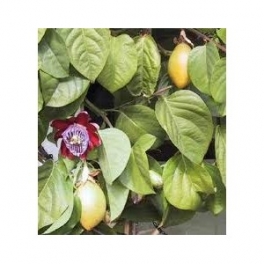PASSIONFRUIT
Passiflora edulis
leafs, 250g
Family: Passifloraceae
Genus: Passiflora
Species: incarnata, edulis
Common Names: Maracuja, passionflower, carkifelek, charkhi felek, maypop, maypop passionflower, saa't gulu, ward assa'ah, zahril aalaam, granadilla, passionvine, maracoc, apricot-vine, saa't gulu, ward assa'ah, zahril aalaam
Part Used: Vine, Leaves, Stem
| PLANT DESCRIPTION |
Documented Properties
& Actions: |
Nutritive, sedative |
Plant
Chemicals
Include: |
Alkaloids, ascorbic-acid, beta-carotene, calcium, carotenoids, catalase, citric-acid, EO, ethyl-butyrate, ethyl-caproate, fat, fiber, flavonoids, harman, iron, malic-acid, N-hexyl-butyrate, N-hexyl-caproate, niacin, pectin-methylesterase, phenolase,phosphorus, potassium, protein, riboflavin, sodium, thiamin, water, xanthophylls |
Various species of Passiflora, climbing vines native to the South American tropics and rainforest, have been domesticated to eat as fresh fruit or to make refreshing and nutritive juices. In the Brazil Amazon alone, over 200 species of fruit-bearing Passiflora have been cataloged. Yellow passionfruit, (Passiflora edulis) is the most widely cultivated species in the warm humid tropics, and its yellow gelatinous pulp is mixed with water and sugar to make drinks, sherbet, ice cream, jam, jellies and salad dressings. Yellow passionfruit grows on 10 to 20 foot long vines and are the size of large lemons, wrinkling slightly when ripe.
Passionfruit is catching on as a popular drink in both industrial and developing countries and a new fruit juice may be hitting the American market in the near future. Scientist have created a new fruit in a 20 year old research project, called "Passion Pops," by cross breeding the tropical Passiflora edulis with its US relative, Passiflora incarnata and is producing tennis-ball sized fruits. The fruits range in color from yellow to green, dark maroon and purple. One of the benefits of the new fruit is that it will grow farther north than the traditional US passionfruit and provide an alternative to farmers who have been hurt by winter freezes of citrus crops. Several US-based juice companies have expressed interest in the new fruit and some new juice products may be on the market in the near future.
Passionfruit has been a food staple for the people and animals of the Rainforest for eons. The leaves of many of the Passiflora species have been used for centuries by indigenous tribes as a sedative or calming tonic. The passionfruit of Passiflora edulis has been used by the Brazilian tribes as a heart tonic and passionfruit is still used today in South American traditional medicine. Antonio Bernardes notes that: "A cup of Maracuja tea [leaves] or 2 glasses of juice will naturally calm down the most hyperactive child, and for this reason it is highly valued by Brazilian mothers." and Daniel B. Mowrey notes: "The Brazilians even have a favorite passion flower drink, calledmaracuja grande, that frequently used to treat asthma, whooping cough, bronchitis and other tough coughs." In Peruvian traditional medicine today, passionfruit juice is used for urinary infections and as a mild diuretic. Researchers have documented the properties of passionfruit juice in at least 4 studies.
| ETHNOBOTANY: WORLDWIDE USES |
| Brazil |
Food, sedative |
| Peru |
Food, diuretic, urinary infections |
| Amazonia |
Food, heart tonic |
Package with 250g
 Maximize
Maximize







































